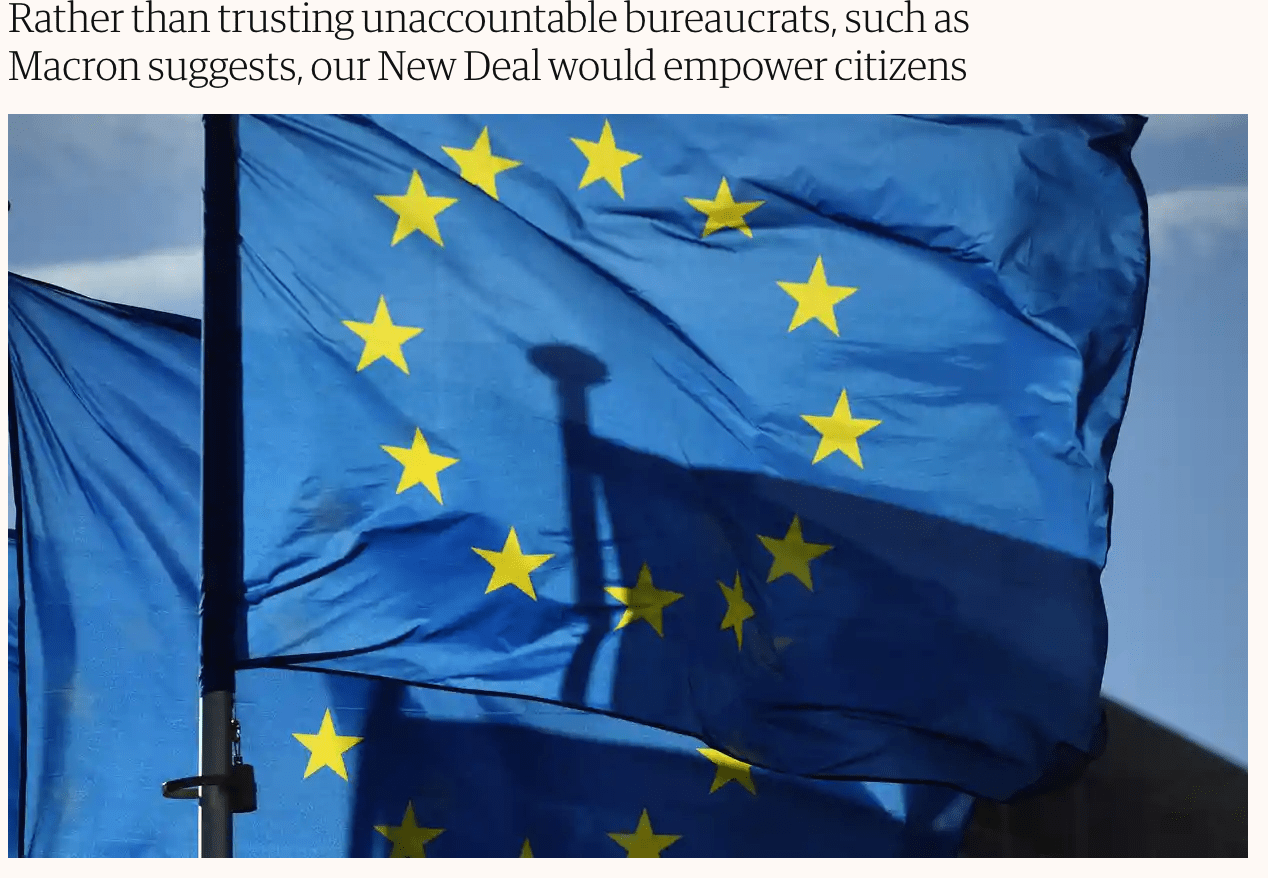The European Union is fragmenting at a time when Europeans need it the most. Emmanuel Macron is right to point this out. But he is wrong to push another top-down agenda that lacks credibility, fails to speak to European’s concerns, and entrenches the democratic deficit at the heart of the EU. By entrusting Europe’s renewal to its unaccountable bureaucrats, Macron’s programme will only deepen the discontent that has given rise to the ultra-right he claims to oppose. Over the past 12 months, we have worked with political parties, activists and practitioners to develop a different kind of renewal programme – one that offers immediate solutions to Europe’s overlapping crises, that gives control back to citizens
Topics:
Yanis Varoufakis considers the following as important: Campaigning, DiEM25, English, European Crisis, EUROPEAN SPRING, Op-ed, The Guardian
This could be interesting, too:
run75441 writes FBI Warrant sought nuclear weapons documents at Mar-a-logo
Chris Blattman writes The United States is not headed for civil war
Chris Blattman writes Is America on brink of civil war? Such predictions are overblown and dangerous.
Chris Blattman writes Why I think the west should support Ukraine big time, but also why we shouldn’t ignore the risks


The European Union is fragmenting at a time when Europeans need it the most. Emmanuel Macron is right to point this out. But he is wrong to push another top-down agenda that lacks credibility, fails to speak to European’s concerns, and entrenches the democratic deficit at the heart of the EU. By entrusting Europe’s renewal to its unaccountable bureaucrats, Macron’s programme will only deepen the discontent that has given rise to the ultra-right he claims to oppose.
Over the past 12 months, we have worked with political parties, activists and practitioners to develop a different kind of renewal programme – one that offers immediate solutions to Europe’s overlapping crises, that gives control back to citizens in their communities, and that sets out a long-term vision for our democratic union. It is called a New Deal for Europe and it will be put to voters across the continent in May’s European parliament elections by our European Spring – the transnational coalition of progressive forces brought together by Democracy in Europe Movement (DiEM25).
The current political groupings in the European parliament are cynical alliances of convenience, comprising disparate forces and lacking a coherent agenda for Europe. Traditional conservatives are torn between moderates such as Angela Merkel and recalcitrant xenophobes such as Hungarian prime minister Viktor Orbán. The social democrats are trying to wean themselves off their destructive austerity agenda while being led down the path to electoral oblivion by Frans Timmermans, the Dutch first vice-president of the European commission and austerian hawk. The European Left party contains factions that disagree fiercely among themselves on migration, the euro and their broader attitude toward the EU. The European Greens remain divided on fiscal policy – and even on the funding of their worthy green transition programme.
In 2017, we invited Europe’s progressive movements to an open discussion of what needs to be done to tackle Europe’s five crises: underinvestment in the green transition, rising precariousness in the labour market, the crisis of the banking sector, the mountain of public debt that gave cover to austerity policies and, last but not least, the deep contempt for democracy in the EU’s decision-making centres. That gathering developed organically into the transnational, pan-European coalition we call the European Spring – the electoral vehicle that will present our New Deal to Europe’s voters this coming May in at least 10 countries.
Unlike most electoral manifestos, written in backrooms by special advisers, our New Deal was co-authored via open consultation with citizens and ratified by a transnational democratic vote in which every European could participate. It contains ambitious measures that could be implemented tomorrow morning, such as a Green New Deal that would plough €500bn each year into Europe’s ecological transition and a solidarity programme that would redirect central bank profits to an emergency anti-poverty fund.
But while replete with pan-European “big picture” policies, our New Deal will not result in more centralised power in the hands of unelected European bodies. Instead, by unshackling governments from fiscal constraints and competition directives enforced by Brussels, our New Deal will enhance democratic authority at every level – a sharp contrast to Macron’s “ambitious” agenda. There will be no Jupiterian salvation for the EU – Macron’s tenure has confirmed as much. Only a programme that citizens across Europe devise and implement can restore hope and enthusiasm in their hearts and minds.
May’s European parliament elections are presented as a faceoff between two camps: liberal Europhiles versus illiberal Eurosceptics: Emmanuel Macron versus Matteo Salvini. Or it is the “false prophets” versus the “European patriots”. Alas, this is a misleading account. Establishment figures such as Macron have lost their credibility even with centrist citizens. To rally voters, they rely on the threat that nationalists such as Salvini represent. Equally, strongmen such as the Italian deputy prime minister desperately need a hapless European establishment to fashion themselves as worthy rebels.
The only way to break this repugnant loop-wrecking Europe is a credible New Deal for Europeans – an antidote to the depressing belief that the only alternative to this EU is its breakup. In other words, our position does not fall on either side of the dichotomy between so-called pro-European and anti-European forces. We are for our Europe, but against this Europe. The purpose of European Spring is to revive Europeans’ belief that the EU is ours to shape and that we can start doing this tomorrow morning even within the EU’s current institutional setting – before moving on to transforming and democratising those very institutions in the medium term.
